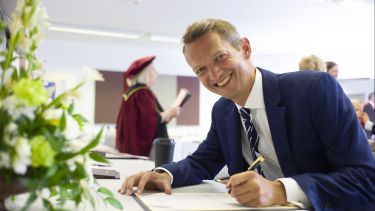- Andy Haldane, former Bank of England chief economist and head of the Royal Society of Arts, will chair the industrial board at University of Sheffield Advanced Manufacturing Research Centre (AMRC) for the next three years
- With his appointment, Andy Haldane brings a wealth of experience that will help shape and set the strategy for the AMRC, and the might of its 120 industrial members, on where to put its horsepower and innovation in the future to help the UK manufacturing sector grow
- The AMRC, part of the High Value Manufacturing Catapult, works with manufacturing companies of all sizes, from SMEs to global giants of industry, to help businesses improve productivity and save time, money and energy
Former Bank of England chief economist and head of the Royal Society of Arts, Andy Haldane will chair the industrial board at University of Sheffield Advanced Manufacturing Research Centre (AMRC) for the next three years.
The AMRC, part of the High Value Manufacturing Catapult, works with manufacturing companies of all sizes, from SMEs to global giants of industry, to help businesses improve productivity and save time, money and energy. The purpose of the industrial board is to advise on the topics for the AMRC’s research and development roadmap, ensuring that its work focuses on the right challenges and opportunities for industry.
With his appointment, Andy Haldane brings a wealth of experience that will help shape and set the strategy for the AMRC, and the might of its 120 industrial members, on where to put its horsepower and innovation in the future to help the UK manufacturing sector grow.
He said taking the post at the AMRC, which has a footprint in South Yorkshire, Lancashire and north Wales, was a ‘coming together of topics’ that have been at the centre of his career at the Bank of England, advisory roles to government and, more recently, the Royal Society of Arts (RSA).
“In my role at the Royal Society of Arts, manufacturing and commerce is in the spirit of how we regenerate people, place and planet through creativity, innovation and business. What better fusion is there of these things than here at the AMRC?
“There is no secret to success economically, socially or environmentally. It comes from combining the very best of innovation with a partnership way of working that straddles the public and private sectors and wider communities. That’s how growth has been nurtured in every country on the planet since the industrial revolution. The AMRC is the model for that - pushing the frontier of innovation through partnership working.”
Steve Foxley, chief executive officer at the AMRC, is delighted Andy has joined the AMRC and says his skills and experience will be ‘a vital contribution’ to achieving its strong ambitions for the future of manufacturing.
He added: “Our focus has always been on driving impact in industry through our innovation work which brings a better promise to the whole of the UK but particularly in the places where we operate in South Yorkshire, Lancashire and north Wales. Having such a respected leader in areas such as global economy, industrial strategy and levelling up will accelerate our journey and unlock new potential to reach our vision.”
Professor Koen Lamberts, President and Vice-Chancellor of the University of Sheffield, said: “Andy has shown a real commitment to supporting innovation-led growth in South Yorkshire and beyond. His wealth of experience will bring important insight and a fresh perspective to the work of the AMRC and we are excited to have him on board.”
Andy, who studied economics at the University of Sheffield, was appointed as the head of the Levelling Up Taskforce in 2021 for the Department for Levelling Up, Housing and Communities, under Secretary of State Michael Gove. In 2022, he was appointed as chair of the government’s Levelling Up Advisory Council.
He currently holds the post of chief executive of the Royal Society of Arts (RSA), a charity with a 250-year history of social impact through innovation and civic participation for the arts, manufacturers and commerce.
Prior to this, he was chief economist at the Bank of England and a member of its monetary policy committee. He has also been executive director for financial stability and a member of its financial policy committee. Haldane worked extensively on international financial issues, including for the International Monetary Fund (IMF).



